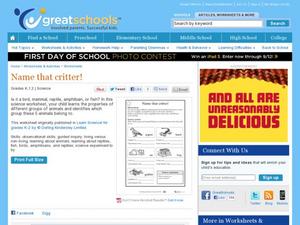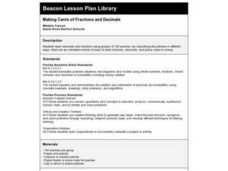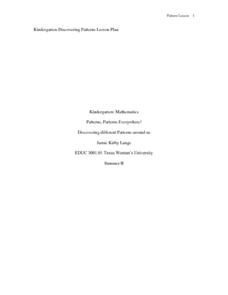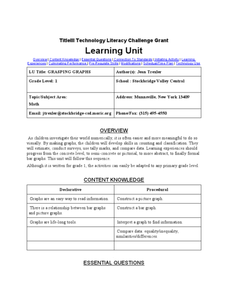Curated OER
Angle Exploration and Classification
Students compare and contrast angles and identify them as acute, obtuse, right, or straight angles. They create rays and angles using uncooked spaghetti, read and discuss key vocabulary terms, and complete a variety of geometry worksheets.
Curated OER
It Counts
Students classify and compare plants using specific information, observations, and numbers. In this mathematical inquiry lesson, students use plant characteristics to describe, compare, and classify them. They attempt to develop a system...
Curated OER
Do Touch!
Students explore the sense of touch. They investigate unknown solids using the sense of touch. Pupils use their senses of touch to match feely gloves. Students explore body parts, by tracing their hands and feet on paper. They create a...
Curated OER
Name That Critter
Young learners classify five different animals into their proper category. The animals pictured are a pigeon, a lizard, a cat, a frog, and a goldfish. Pupils are also asked to tell why they know it's a certain kind of animal. An...
Curated OER
Sorting Sets
Here is a simple sorting activity which is appropriate for pre-k and kindergarten learners. Pupils sort each of four items into the correct group, then count the totals and write the numbers in the boxes provided. Along with being a good...
Curated OER
Clay Tile: Art Deco Style
Students analyze and classify sets of pictures using a mathematical classification system and create original works of Art Deco tiles using this new knowledge and four types of symmetry.
Curated OER
Interactivate - Lines, Rays, Line Segments, and Planes
Students explore lines, rays, line segments, and planes. For this math lesson, students discuss the math concepts and direct their instructor in graphing functions. Students collaborate in graphing additional functions.
Third Rail Games
Factor Samurai
Master composite and prime numbers with this fast-moving game. Using your sword, slice those composite numbers and watch them break up into factors. Slice again if those factors are composite. However, watch out for prime numbers,...
Curated OER
Making Cents of Fractions and Decimals
Students explore decimals and fractions using groups of 100 pennies. By classifying the pennies in different ways, there are an unlimited number of ways to learn fractions, decimals, and place value in money. This is a good, hands-on...
New York City Department of Education
Egypt
This six-week unit encompasses all subjects with a focus study on world history and the development of ancient civilizations. As gifted and talented students dive into the interesting yet challenging topic of Egypt, they think critically...
Curated OER
Comprehension of Word Problems
Third graders explore math functions by completing a worksheet in class. In this word problem solving lesson, 3rd graders read a book titled Counting on Frank by Rod Clement and utilize the information in the story to answer study...
Curated OER
Coin Count & Classification
Students make a prediction about how 100 pennies sort by decade or year and then test their predictions. They organize their data using a graph that is imbedded in this lesson.
Curated OER
Identifying and Classifying Solid Figures
Students identify solid figures. In this classification lesson, students recognize and name solid figures. Students identify which figures contain polygons and rectangles. Students practice counting vertices, faces and edges.
Curated OER
Identify, Sort, Classify
Students identify, sort, and classify. In this kindergarten math lesson plan, students explore visual examples of sorting with 1 or more attributes. Students also practice solving problems that their instructors model.
Curated OER
Classify Triangles
Here is a classifying triangles practice instructional activity in which learners sharpen their problem solving skills as they solve six story problems.
Curated OER
Beautiful Bovine
Looking for a fun and interactive way to explore bovine biology? Learners read a brief informational text (included for printing) before participating in several cross-curricular activities. First, grab their attention with a hilarious...
Curated OER
Sorting and Classifying
Fifth graders are engaged in sorting and classifying geometric shapes of various colors and sizes. They discuss the properties of these shapes and illustrate a range of classifications using Venn diagrams.
Curated OER
Property Lists for Quadrilaterals
High schoolers establish classifications of shapes by various properties (angles, sides, etc.). They introduce the important properties of common shapes. Students develop an awareness of the wide variety of ways the 2-D shapes can be alike.
Curated OER
Slope & Rate of Change
This short handout addresses the concept of slope in two different ways: geometrically and analytically. Start with a brief description of slope, then use graphical representations to compare positive vs. negative slope and zero vs....
Texas Woman’s University
Patterns, Patterns Everywhere!
Not only is pattern recognition an essential skill for young children to develop, it's also a lot of fun to teach! Over the course of this lesson, class members participate in shared readings, perform small group activities, and complete...
Illustrative Mathematics
Are These Right?
Is that a right triangle or a wrong triangle? Young mathematicians look at eleven different shapes and use a measuring tool of their choice to determine which triangles have right angles. Consider cutting out sets of the shapes to...
Geometry Accelerated
Accelerated Geometry Review Sheet
Your geometry learners use their knowledge of various geometric concepts to write proofs. Starting with givens containing parallel line segments with transversals and triangles and quadrilaterals, and the mid-point and distance formulas;...
Novelinks
Zach’s Lie: Magic Squares
Individuals match vocabulary words within a magic square, a concept that ties in nicely with math class. The words are all located in Zach's Lie and were specifically selected to increase comprehension of the text. Fifth in a series of...
Curated OER
Technology Literacy Challenge Grant Learning Unit
First graders explore counting and classification. They sort leaves, create graphs, write sentences for the data in the graphs, develop graphs for shapes, favorite animals, birthdays, and participate in a die prediction game.
Other popular searches
- Blooms Taxonomy Math
- Bloom's Taxonomy Math
- Using Taxonomy Math
- Using Blooms Taxonomy Math
- Using Taxonomy Math Lessons
- Blooms Taxonomy Lessons Math
- Blooms Taxonomy Math Median
- Using Blooms Taxonomy in Math
- Bloom's Taxonomy Math Quilt
- Bloom's Taxonomy Math Lesson

























